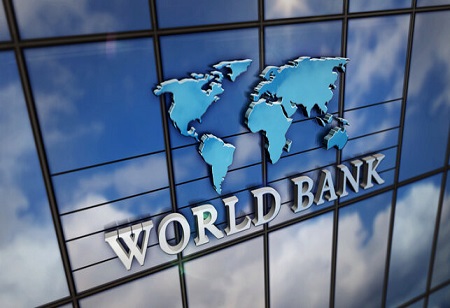
World Bank To Approve Policies To Enhance Lending By USD 50 Billion Over Next 10 Years

 The World Bank's outgoing president, David Malpass, announced that member countries have approved measures that will allow for a $50 billion increase in lending over the next decade. (Apr 12).
The World Bank's outgoing president, David Malpass, announced that member countries have approved measures that will allow for a $50 billion increase in lending over the next decade. (Apr 12).
The move, announced during the International Monetary Fund (IMF) and World Bank spring meetings in Washington, is part of the development lender's ongoing evolution in response to calls for it to address global challenges such as climate change.
Earlier in the day, US Treasury Secretary Janet Yellen urged the World Bank to continue implementing additional reforms this year.
"We should use the rest of the year to implement additional reforms in stages," Yellen said at a roundtable discussion on the evolution of multilateral development banks.
The United States is the World Bank's largest shareholder.
Malpass, who announced his resignation in February, said in a statement late Wednesday that discussions with shareholders this week had "yielded signs of progress" on issues such as greater debt transparency, increased development finance, and more impactful climate action.
"Our member countries endorsed measures that can add up to US$50 billion of IBRD lending capacity over the next ten years," he added, referring to the International Bank for Reconstruction and Development, the bank's middle-income lending arm.
According to Malpass, the importance of concessional resources and private sector investment is fully recognised.
Malpass emphasised that, with financing capabilities falling "far short of the resource needs for development and climate," addressing these needs will necessitate a global effort.
For the time being, a development committee paper outlines changes "that lay the groundwork for further evolution," according to Malpass.
These include a statement stating that while ending extreme poverty and promoting development remain at the heart of the World Bank's work, achieving these goals will necessitate "a stronger focus on sustainability, resilience, and inclusiveness."
The paper also includes proposals to help the private sector develop and facilitate private capital, among other things.
French Economy Minister Bruno Le Maire, who met with Yellen and Malpass on Wednesday, stated that there is a "historic opportunity" to bring the necessary financial resources to developing countries through development lender reform.
He emphasised the importance of closing the growing gap between developed and developing countries, saying that "the situation has now become really critical."
Yellen also stated that more efforts are needed to make progress.
She said in a speech that global leaders can use upcoming events like the Group of 20 Leaders' Summit in September to "keep the momentum strong."
Yellen told AFP ahead of the spring meetings that Malpass, who will leave at the end of June, has laid a "solid foundation" for the ongoing reform effort.
She anticipates that US candidate Ajay Banga will succeed Malpass and continue the transformation.
Debt restructuring is another key issue on the agenda for the spring meetings, and leaders at a global sovereign debt roundtable committed to additional efforts to help speed up restructurings.
The IMF, World Bank, and India, which currently holds the G20 presidency, co-chair the debt roundtable.

